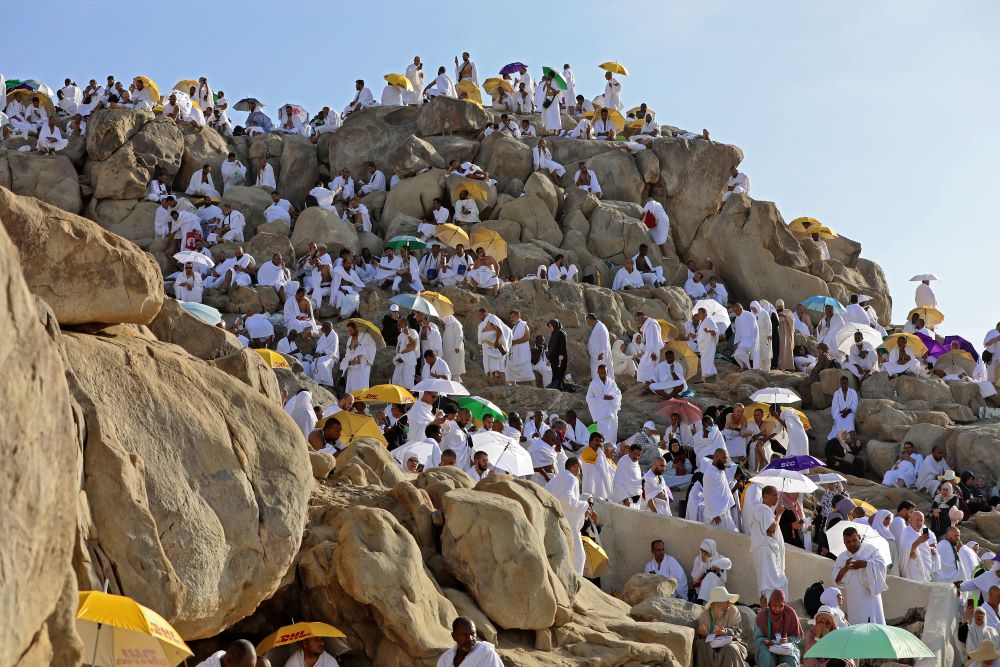Mount Arafat: Huge crowds of robed Muslim pilgrims prayed on Saudi Arabia's Mount Arafat on Friday, the climax of the biggest hajj pilgrimage since the pandemic forced drastic cuts in numbers two years in a row.
Groups of worshippers, many holding umbrellas against the fierce sun, recited verses from the Koran on the rocky rise, where the Prophet Mohammed (PBUH) gave his final sermon.
Prayers on Mount Arafat are the highlight of the pilgrimage, capped this year at one million people including 850,000 from abroad.
Pilgrims, many in white robes, chanted "Oh God, here I am" as they reached Mount Arafat on foot or in buses from their nearby tents.
After sunset, they will travel the short distance to Muzdalifah, where they will sleep under the stars before performing the symbolic "stoning of the devil" ceremony on Saturday.
"I am so happy to be here... This is the biggest hajj in the coronavirus era, but it isn't big enough yet," Egyptian pilgrim Saad Farhat Khalil, 49, told AFP.
"There are one million here today, but if the Saudis allowed more, 10 million would have come," he added.
Entry roads were packed with worshippers as helicopters buzzed overhead and volunteers handed out bottles of water and collected rubbish in green plastic bags.
The hajj, usually one of the world's largest annual religious gatherings, is among the five pillars of Islam and must be undertaken by all Muslims with the means at least once in their lives.
In 2019, as in previous years, some 2.5 million Muslims from around the world took part, a figure that dropped to a few thousand in 2020 and 60,000 in 2021.
A number of world leaders have participated this year, including Mauritania's president and Indonesia's vice president. State media on Friday reported that Chechen strongman Ramzan Kadyrov had arrived in the kingdom to perform the hajj.
Covid fears
At noon, thousands of pilgrims prayed in Namirah mosque, where the Prophet Mohammed gave sermons.
"In 2020 I thought I would never do hajj. It seemed like the end of time. But here we are today, God is great," said Bassam Mohammed, another Egyptian pilgrim.
The large crowds have spurred fears that Covid will spread, especially after many pilgrims went without face masks at the Grand Mosque in Mecca, despite claims by Saudi authorities that masks would be mandatory.
The hajj is taking place against the backdrop of a resurgence in the region, with some Gulf countries tightening restrictions to keep outbreaks in check.
All participants were required to submit proof of vaccination and negative PCR tests. On reaching their white-tent encampment at Mina on Thursday, they were handed bags containing masks and sanitiser.
Health ministry spokesman Dr Muhammad al-Abdulaali told a press conference Thursday evening that so far no Covid cases had been detected among the pilgrims, though it was unclear whether widespread testing was taking place.
"The health status of the pilgrims is reassuring, and no disease outbreaks affecting public health have been recorded," he said.
Heat warnings
The pilgrimage can be physically draining even in ideal conditions, but worshippers this year have faced an added challenge: scorching sun and temperatures well over 40 degrees Celsius (104 Fahrenheit).
On Friday, the temperature hit 44 degrees Celsius at Mount Arafat, state-run Al-Ekhbariya reported.
Islam forbids men from wearing hats once the rites start, and many have been seen shielding themselves with umbrellas, prayer mats and even, in one case, a small bucket filled with water.
Women, meanwhile, are obliged to cover their heads with scarves.
"We can tolerate (the heat)... The more we tolerate, the more our pilgrimage is accepted," Laila, a 64-year-old Iraqi pilgrim who gave only her first name, told AFP.
Saudi officials have touted their preparations for the extreme conditions, highlighting the hundreds of hospital beds allocated for heatstroke patients and the "large number of misting fans" they have provided.
Dozens of trucks are distributing umbrellas, water bottles and small fans.
Nevertheless, the National Centre for Meteorology, which has set up an office in Mina, is sending warnings to pilgrims on their mobile phones, urging them to avoid outdoor rituals at certain times of the day, especially at noon.
On Saturday, Muslim pilgrims will take part in the "stoning", the last major ritual of the hajj which has previously led to deadly stampedes, as hundreds of thousands converge on a small space.
After the stoning ritual, pilgrims return to the Grand Mosque in Mecca to perform a final "tawaf" or circling of the Kaaba, the cubic structure that is the focal point of Islam.
Eid al-Adha, the feast of the sacrifice that begins on Saturday, marks the end of hajj.










